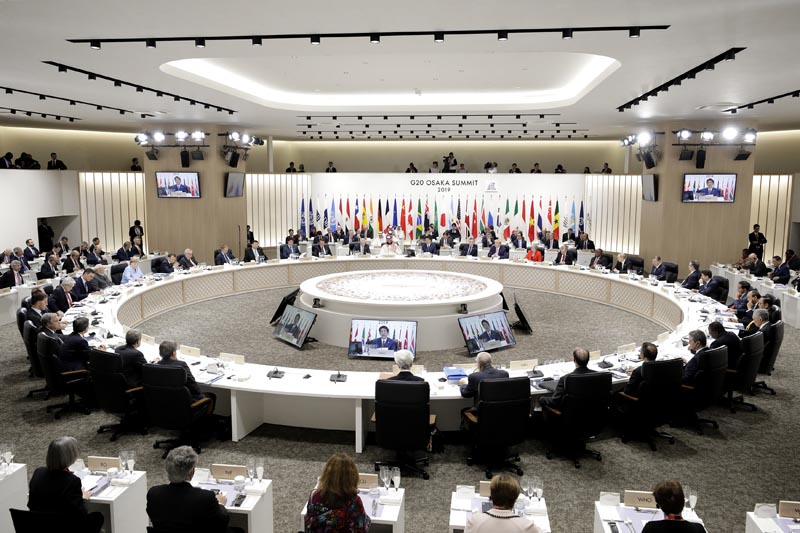G-20 leaders facing calls to protect growth, open trade
OSAKA: World leaders attending a Group of 20 summit in Japan that began Friday are clashing over the values that have served for decades as the foundation of their cooperation as they face calls to fend off threats to economic growth.
"A free and open economy is the basis for peace and prosperity," Japanese Prime Minister Shinzo Abe told his counterparts in opening the two-day G-20 meeting that comes as leaders grapple with profound tensions over trade, globalization and the collapsing nuclear deal with Iran.
While groups like the G-20 endeavour to forge consensus on broad policy approaches and geopolitical issues, the rifts between them run both shallow and deep.
Speaking before the formal opening of the summit, European Union President Donald Tusk blasted Russian President Vladimir Putin for saying in an interview with the Financial Times newspaper that liberalism was "obsolete" and conflicts with the "overwhelming majority" in many countries.
"We are here as Europeans also to firmly and unequivocally defend and promote liberal democracy," Tusk told reporters. "What I find really obsolete are: authoritarianism, personality cults, the rule of oligarchs. Even if sometimes they may seem effective."
As US President Donald Trump, Chinese President Xi Jinping, Putin and other leaders met on the sidelines of the summit, Tusk told reporters that such comments suggest a belief that "freedoms are obsolete, that the rule of law is obsolete and that human rights are obsolete."
Putin praised Trump for his efforts to try to stop the flow of migrants and drugs from Mexico and said that liberalism "presupposes that nothing needs to be done. That migrants can kill, plunder and rape with impunity because their rights as migrants have to be protected."
A planned meeting between Trump and the Chinese president on Saturday as the G-20 meetings conclude has raised hopes for a detente in the tariffs war between the world's two largest economies.
US Trade Representative Robert Lighthizer and Commerce Secretary Wilbur Ross accompanied Trump to Osaka, suggesting potential for some movement after 11 rounds of talks stalled in May.
But while prospects for detente in the trade war are in the spotlight, many participating were urging a broader perspective in tackling global crises.
"I am deeply concerned over the current global economic situation. The world is paying attention to the direction we, the G-20 leaders, are moving toward," Abe said. "We need to send strong message, which is to support and strengthen a free, fair and indiscriminatory trade system."
A major breakthrough in the standoff is not assured. On Thursday, a Chinese foreign ministry spokesman in Beijing reiterated that China is determined to defend itself against further US moves to penalize it over trade friction. China often has sought to gain support for defending global trade agreements against Trump's "America First" stance in gatherings like the G-20.
Threats by Trump to impose more tariffs on Chinese exports "won't work on us because the Chinese people don't believe in heresy and are not afraid of pressure," the spokesman, Geng Shuang, said.
Trump has at times found himself at odds with other leaders in such international events, particularly on issues such as Iran, climate change and trade.
Abe has sought to make the Osaka summit a landmark for progress on environmental issues, including climate change, on cooperation in developing new rules for the "digital economy," such as devising fair ways to tax companies like Google and Facebook, and on strengthening precautions against abuse of technologies such as cyber-currencies to fund terrorism and other types of internet-related crimes.
On the rising tensions between Iran and the US, UN Secretary-General Antonio Guterres said the world can't afford the conflict and it was "essential to deescalate the situation" and avoid confrontation. Iran is soon poised to surpass a key uranium stockpile threshold, threatening the nuclear accord it reached with world powers in 2015.
Iran's moves come after Trump announced in May 2018 that he was pulling the US out of the deal and reimposing economic sanctions on Tehran.
Guterres also urged G-20 leaders to take action on equitable and stable reforms to strengthen the global financial safety net and increase the global economy's resilience.
Guterres said in a letter to the leaders gathered in Osaka that although the world has made progress fixing some big problems, it's not happening fast enough or shared by all countries.
While there are good plans and vision, what's needed are "accelerated actions, not more deliberations," he said.
Fast and equal economic growth should be constructed so that people who live in "the 'rust belts' of the world are not left behind," he said.
The leaders of Brazil, Russia, India, China and South Africa, in a meeting on the G-20 sidelines, called for joint efforts to stabilize international trade and oppose protectionism.
Putin, whose country faces an array of US and EU sanctions, said at the meeting that "international trade has suffered from protectionism, politically motivated restrictions and barriers." Putin also emphasized the need for BRICS nations to take coordinated action to help block sources of funding for terrorist groups.






